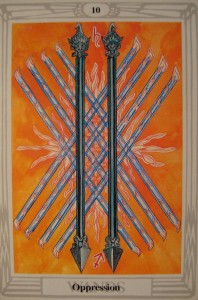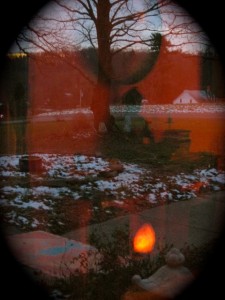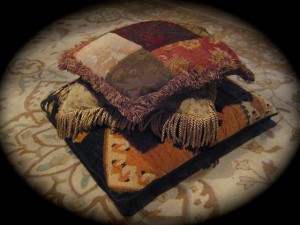
– From the Thoth Tarot deck
The core intent of defense is to protect. Defenses are the actions of the survival instinct; they are nature at work. Both Freud and Jung agreed that psychological defenses originated beneath consciousness, a product of the instinctual or archetypal psyche.
We do not choose our defenses; they are the automatic compulsive actions the deep psyche employs to protect the self against real or imagined threats. Two of the most powerful and deeply-rooted-in-nature defenses are projection and dissociation.
If we feel uncomfortable within ourselves about something we’ve said, done, thought, or felt, our protective psyche might assess this as a threat to our self-esteem or ego integrity. Its response might be to employ the defense of projection whereby it literally projects blame outside of the self, rearranging our conscious perception of reality to keep the culprit at a safe distance, securely planted in someone else. On a grand scale this is how America keeps itself safe from facing its own deviousness: the bad guy is always the devil somewhere else, who we have to eliminate, thus our moral superiority is preserved.
Dissociation is perhaps nature’s most powerful defense. When we are confronted with a danger inwardly or outwardly—that our unconscious deems potentially lethal—dissociation will save us by splitting us into pieces, preserving our most precious and vital self by submerging it deeply within the safekeeping womb of the unconscious. Outwardly, parts of our ego self remain at the surface as an adaptive or survival self, functionally charged with navigating life disconnected from its wholeness. The English psychoanalyst Winnicott called this self the false self because it always senses that it is just functioning or pretending to be engaged in life, secretly knowing that its most vital parts no longer participate in outer life.
Projection and dissociation are archetypal defenses of the instinctive psyche. These are the default settings of our self-preservation. Unfortunately, when life is governed by these defenses it may be safe but totally unsatisfying, as life’s deepest needs go unmet. If the adult self attempts to raise its vulnerable parts and bring them into life, the instinctive psyche frequently opposes this action and sabotages the effort using negative thoughts, guilt, or shame. The instinctive psyche is invested in survival; wholeness threatens survival, as we are challenged to own fully our projected and dissociated parts, which may be laden with traumatic experience that could threaten ego integrity.
The solution to this dilemma lies in recapitulation. In recapitulation the adult self takes 100% responsibility for healing, releasing the instinctive psyche of its automatic protection. As the adult ego bears the full tension of encountering and integrating its parts, the instinctive psyche simultaneously tests the adult self, confronting it with all that has been projected and dissociated from and all of its accompanying terrors of disintegration. This testing process of the adult ego’s ability to manage the fullness of the self is a necessary interaction between archetypal defense and conscious ego. This may result in a one-step forward two-steps back kind of process for a while, but ultimately, once the instinctive psyche sees the ego’s ability to manage its own healing, the higher self is freed to support the ego in the recapitulation process through increasing synchronicities, dreams, and visions that lead to retrieval of its lost wholeness.

– from the Thoth Tarot deck
Evolution is really about assuming full conscious responsibility for our lives so that we may be available for all else that is. If we allow our unconscious nature to merely keep us safe, it will, but only through its compulsive defenses and at the expense of our wholeness, our fulfillment, and our evolutionary potential. Is that really satisfying? Or are we ready to do the work to free ourselves from the divisiveness of our instinctual defenses and claim our true wholeness?
Recapitulation is work that is evolutionary for the individual—know thy self—and the world-at-large too. In moving beyond our personal projections and dissociations we open ourselves to more fully experiencing and participating in life in ways that we are unavailable for while under the control of nature’s defenses.
There exists another aspect to nature as well, the interconnected oneness of everything, and that’s really the nature our evolutionary self is striving to discover and cultivate. In fact, the collective charge of our time seems to be pushing us all to go beyond the self. That is really our greatest evolutionary endeavor.
Going beyond, with love and gratitude,
Chuck
Note: We pulled these two cards this morning, certainly in alignment with the publishing of this blog and our pursuit of truth and spirit.



